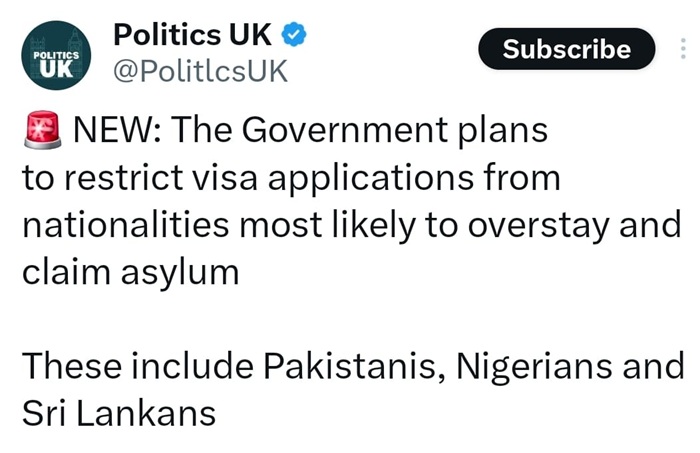
The UK’s Home Office will restrict work and study visa applications from nationalities including Sri Lankans, Pakistanis, and Nigerians, who are most likely to overstay and claim asylum.
Under Labour’s plans to crack down on abuse of the system, visas will be rejected for individuals who fit the profile of someone who will go on to claim asylum and are from countries with high rates of asylum claims in the UK.
Officials will also use bank statements submitted by visa applicants to reject claims that they are destitute and require taxpayer-funded accommodation, such as hotels.
It is understood that the measures will be announced as part of efforts to prevent work and study visas from being used as a backdoor into Britain’s asylum system. They will be part of the government’s Immigration White Paper, due to be published next week, that will detail Sir Keir Starmer’s plan for reducing net migration, which stood at 728,000 last year.
The curbs are likely to prompt a backlash from those countries included, who may feel it discriminates against them. Legal sources said the move would be discriminatory and would be challenged in the courts.
Immigration reforms were promised in Labour’s general election manifesto last year but have taken on added impetus after the party was trounced by Nigel Farage’s Reform in last week’s local elections.
Other reforms expected include restrictions that will force foreign graduates to leave the UK unless they get a graduate-level job, which will be based on skill levels rather than salary.
Being granted asylum gives individuals the opportunity to stay in the UK permanently, whereas work and study visas are only temporary. Rejected asylum seekers can prolong their stay — sometimes indefinitely — by making repeated appeals to frustrate their deportation.
Yvette Cooper, the Home Secretary, is concerned about a sharp increase in migrants on work and study visas who go on to claim asylum and are housed in Home Office-provided accommodation.
Last year, 40,000 asylum claims were lodged by people who had held a UK visa, 37 per cent of the total and more than the 35,000 asylum applications from migrants who arrived on small boats. Nearly 10,000 asylum claimants who had originally arrived in the UK legally on work or study visas were living in taxpayer-funded accommodation, such as hotels, at some point last year.
Cooper is planning to introduce measures to bar migrants who came to the UK on a work or study visa from claiming taxpayer-funded accommodation. Asylum seekers can claim accommodation and other financial support if they are destitute or likely to become destitute. However, work and study visa holders must prove they have sufficient funds to sustain themselves while in the UK.
Officials will be instructed to use the bank statements submitted by visa holders as part of their assessment when deciding whether to grant them asylum accommodation. This will make it significantly harder for asylum seekers to claim free accommodation if they came to the UK on a visa.
The Home Office is also building intelligence to enable caseworkers to spot patterns in the profile of people who are most likely to abuse work and study visas as a loophole to claim asylum. They have earmarked Pakistani, Nigerian and Sri Lankan visa holders as the most likely to go on to apply for asylum, according to government sources.
Officials are working with the National Crime Agency (NCA) to build a model that would reject a visa claim from a migrant who fits the profile of someone likely to go on to claim asylum.
They have identified patterns of behaviour, such as low engagement in university courses, of individuals who have used the routes to claim asylum.
The Home Office and NCA will also investigate interactions of visa applicants from countries with high rates of asylum claims to check whether they have been in contact with suspected people smugglers or individuals who teach migrants how to use the UK’s visa system as a back door to claiming asylum.
Of the 40,000 asylum claims lodged last year by people who had held a UK visa, 16,000 were originally foreign students, 11,500 had a work visa, 9,500 had a visitor visa, and the remaining 7 per cent had other forms of leave.
Asylum seekers can also claim protection for family members who are with them. There has been a surge in the number of migrants on study and work visas bringing dependents in the last three years, with Indians and Nigerians the most likely to do so. (The Times)



